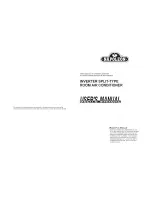
◄
Page 35
►
18. Labelling
Equipment shall be labelled stating that it has been de-commissioned and emptied of refrigerant. The
label shall be dated and signed. Ensure that there are labels on the equipment stating the equipment
contains flammable refrigerant.
19. Recovery
• When removing refrigerant from a system, either for service or decommissioning, it is recommend-
ed good practice that all refrigerants are removed safely.
• When tranferring refrigerant into cylinders, ensure that only appropriate refrigerant recovery
cylinders are employed. Ensure that the correct numbers of cylinders for holding the total system
charge are available. All cylinders to be used are designated for the recovered refrigerant and
labelled for that refrigerant(i.e special cylinders for the recovery of refrigerant). Cylinders shall be
complete with pressure relief valve and associated shut-off valves in good working order.
• Empty recovery cylinders are evacuated and, if possible, cooled before recovery occurs.
• The recovery equipment shall be in good working order with a set of instructions concerning the
equipment that is at hand and shall be suitable for the recovery of flammable refrigerants. In addi-
tion, a set of calibrated weighing scales shall be available
• and in good working order.
• Hoses shall be complete with leak-free disconnect couplings and in good condition. Before using
the recovery machine, check that it is in satisfactory working order, has been properly maintained
and that any associated electrical components are sealed to prevent ignition in the event of a refrig-
erant release. Consult manufacturer if in doubt.
• The recovered refrigerant shall be returned to the refrigerant supplier in the correct recovery cylin-
der, and the relevant Waste Transfer Note arranged. Do not mix refrigerants in recovery units and
especially not in cylinders.
• If compressors or compressor oils are to be removed, ensure that they have been evacuated to an
acceptable level to make certain that flammable refrigerant does not remain within the lubricant.
The evacuation process shall be carried out prior to retruning the compressor to the suppliers. Only
electric heating to the compressor body shall be employed to accelerate this process. When oil is
drained from a system, it shall be carried out safely.
20. Transportation, marking and storage for units
1. Transport of equipment containing flammable refrigerants Compliance with the transport regula-
tions
2. Marking of equipment using signs Compliance with local regulations
3. Disposal of equipment using flammable refrigerants Compliance with national regulations
4. Storage of equipment/appliances
The storage of equipment should be in accordance with the manufacturer’s instructions.
5. Storage of packed (unsold) equipment
Storage package protection should be constructed such that mechanical damage to the equipment
inside the package will not cause a leak of the refrigerant charge.
The maximum number of pieces of equipment permitted to be stored together will be determined by
local regulations.
















































